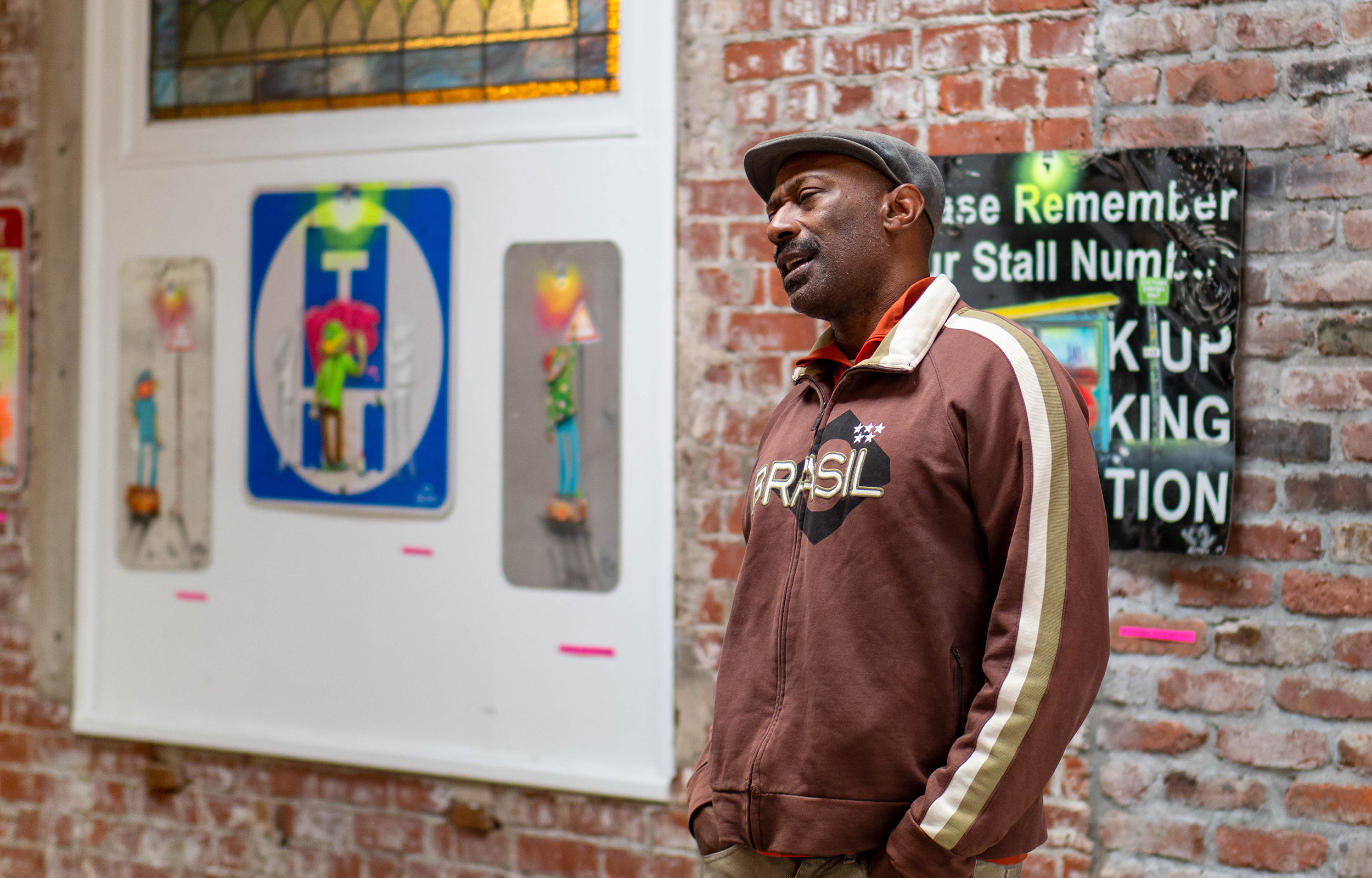
It’s not Deep
Breaking it Down with Harley White Jr.
May 2020
Read the full interview ->
Pulitzer Prize-nominated musician and composer Harley White Jr. has been living life out loud, one note at a time, since the moment he picked up his first instrument (a violin) at the daybreak of his youth. Although the self-described “Bluesician” is best known as a virtuoso bassist, White, leader of the Harley White Jr. Orchestra, always had an eye for sounds, and the mellifluous colors that span across each measure. The Northern California-based instrumentalist’s talents earned him a 2015 Pulitzer Prize nomination as musical director of Mark Stein’s “Direct From Death Row, The Scottsboro Boys: An Evening of Vaudeville and Sorrow.”
The Harley White Jr. Orchestra is Harley White (bass), Darius Babazadeh (alto sax), Reagen Branch (tenor sax), Byron Colborn (baritone sax), Justin Au (trumpet), Aaron Smith (trumpet), Brandon Au (trombone), Clark Goodloe (piano) and Erinn Anova (arranger, resident diva).
“I don’t believe in labels. I think they are a 20th-century idea that was very helpful finding music in record stores back in the day, but in my world, Beethoven sits right next to Chuck Berry, it’s all interconnected. Whether jazz, classical, funk, or blues—I make music.”
I come from “can-do” people, so dwelling on the disadvantages that African Americans deal with in America is not in my DNA, I set my mind on something and just get it done. At some point, you don’t have time for excuses, you just got to get it done.
My grandma, Laura Louise, was strong, independent, and entrepreneurial, but mostly she didn’t take shit from anyone. She let me know that I was great and smart and held me to a high standard. She also told me not to take shit from people, that they can all kiss my ass. It’s not deep.
Working with her at flea markets and clothing stores, I saw her deal with customers from all walks of life, including many cross-dressing performers during the 70s. She was a force of action, and that shaped me as a person, teaching me to hustle, work hard, and treat all people with respect. Yeah, do what you’re told and apply yourself. She did the same with my cousins. If you look at my family, especially the women in my family, we all have college degrees; in fact, my grand-uncle, James Smith, who had lost a leg, attended Tuskegee University in the 1890s, and after teaching, he eventually became the Principal of the segregated black grade school in his hometown of Bastrop, Louisiana. He was the first in our family to become an educator.
Both sides of my family are musically talented, and I’m very fortunate because my dad is one of the top musicians and educators in the Bay Area. When I was a kid, driving around with him in his car, we weren’t listening to r & b, we listened to classical music and jazz. His two concessions were Earth, Wind and Fire, and Bill Withers. Though, I did listen to r & b records around my mom and my aunts.
To this day, my dad is always teaching and talking about music, it’s the most annoying thing about him. On every visit, you’re going to get a music lesson. Two hours on the road, from Sacramento to Oakland, come in the house and sit down on the couch, my dad nags, “come to the piano, man.” “No, dad, let me get some water.” “No, I got to show you this arrangement…”
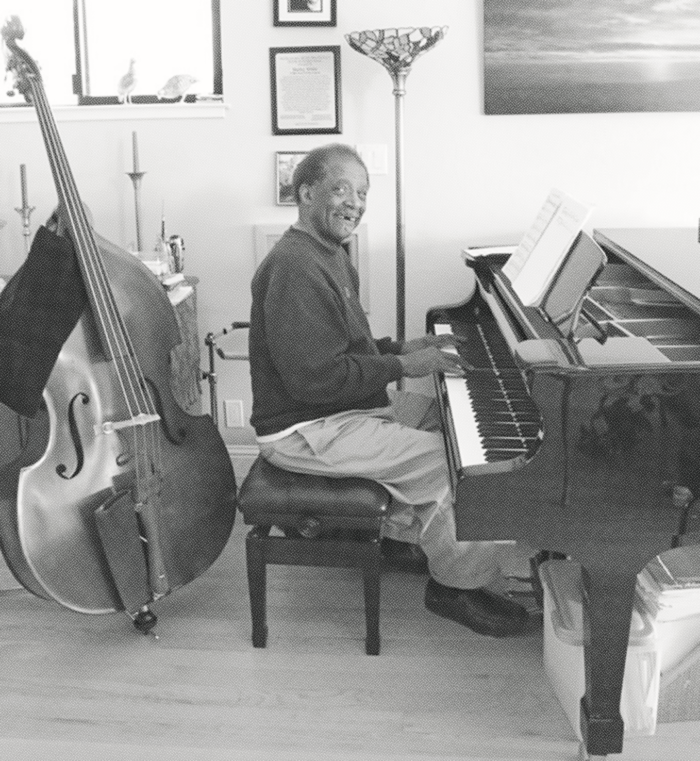
It always happens. I don’t take it personally because my brothers and sisters, who don’t play music, get the same treatment. Even my niece, she’s like, “Grandpa, I don’t play the piano.” But, “no, that’s fine, let’s just have a seat and let me show you something.” He taught band class everywhere. When I was in his band, it was at the Alvarado Middle School, but he also taught at Skyline High and San Francisco State. Longfellow Elementary was his first teaching gig, I remember that vividly, being a seven-year-old kid, listening to my dad’s elementary school orchestra playing the theme to Shaft.
Huh? Come on, man. There was this kid on wah-wah guitar. It’s 1974, you’re a 10-year-old kid, and you get to play the theme to Shaft! With a string section and the wah, wah, and I’m just a kid in the audience thinking, oh yeah, this is good. This is the way it should be.
So, between my grandma’s grit and savvy, my mom pushing academics and my dad just being a brilliant musician and educator, my family has enriched my life in so many ways. It was a beautiful environment that allowed me to grow as a person and an artist.
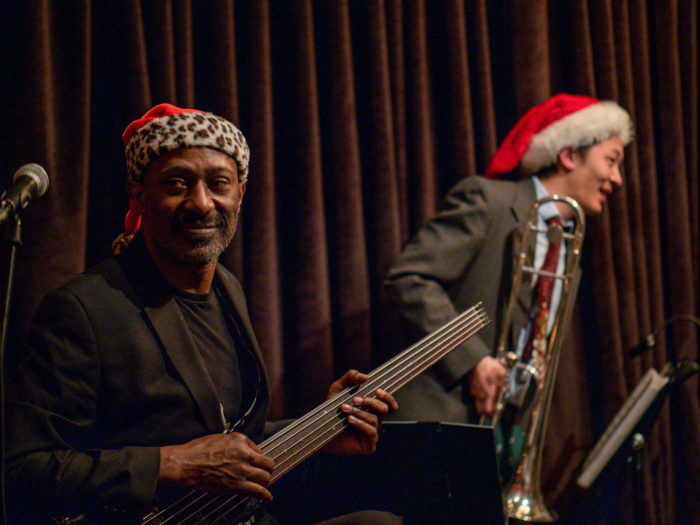
Along the Wayward Path
Music can be such an individualistic thing, and people have all kinds of different talents and abilities. You get interested in it for all sorts of reasons, but at some point, if you want to do something great, you need teammates: you need to buy into something bigger than yourself.
You’re going to have to check your ego and do something for the greater cause, the team. That’s what I learned from my high school band teacher, Mr. Anguilo (Mr. A). I get so frustrated because I don’t see that often, I don’t see people rolling like that now.
I appreciate how he took my abilities to help me find my path. “You’re great, White,” he called you by your last name, “you’re great, you’re wonderful, but we’re not doing it your way. If you don’t agree, there’s the door.” I had to make a choice, and I made the right choice. I stayed in the band, I shut my mouth and did my job.
While kids today might consider that draconian or authoritarian, it wasn’t. It was what was needed to do to win competitions, it’s what we needed to be excellent. Every kid should have that kind of education. I don’t care if it comes from the football team or debate team—anywhere they’re pushed to do their thing at the highest level, but as a team—and that’s hard to do.
After high school, I attended North Texas State, which was amazing. Then I went to the University of Southern California on a full ride, and it was not amazing because when I got there, most of the classes were western classical music classes. I had to do it because that was the degree offered. I was there for jazz, but all the undergrad classes were classical music, so I worked hard and earned A’s in every class. I love music history and music theory, and since I grew up listening to classical music, I wasn’t a fish out of water because I already had a deep love of classical music.
My big thing in college was getting the scores, putting on the classical recordings, and in my mind’s eye, while listening to Debussy, or Stravinsky, watch the music go by as I followed along with the score. That’s my education. That’s why I’m a composer. That was fun for me. I miss that shit because you can see the music going up and down, you see the whole thing. I do have a head for the entire game, and if I went back to school, I would go back for conducting.
Back then, I had no interest in becoming a music teacher, that would come later. As it was, I saw what it did to my dad, and I had no intention of running into that burning building—it’s too bad because I probably would’ve been good at it. I love music, but I knew that school administrators were going to make my life miserable. I can’t be sad in front of a bunch of kids, who wants that? Who wants a band director showing up mad all day, every day? That’s who I would have become teaching in public schools.
When I became a community educator, I didn’t call myself a “teacher” for the longest time because I don’t have the credentials. I believed I’d be disrespecting the education of those who did the work to earn those degrees. But, really, it’s semantics. For the longest time, because it has a broader definition, I’d call myself a music advocate. It allowed me a little more leeway and let me say some things that they can’t.
I love my colleagues working in public education, but they’ve been given a shitty deal when you consider how music education fits in our society. Prop 13 killed all the equitability that allowed kids in lesser advantaged neighborhoods to have music education, but it started long before that, so let’s get to the root of this disparity.
There is a case to be made about cultural appropriation in music and the money that came with it, without any thought of redistribution or reinvestment. This is in America, where blues and jazz were invented, we’re talking about slavery, call and response, and all the things that it took to make a Louis Armstrong. Louis didn’t happen in a vacuum.
I can go through jazz AND blues society photos from the last 40 years, and considering all the youth outreach those organizations made, you won’t find any black kids in those pictures. So, here’s the thing, if you take from our culture to give yourself a little edge, and you want to give back, find a little black girl and give her a clarinet and pay for her lessons, just do something like that and see what follows. You think black kids don’t want to go to Sly Park, get out in the woods, and play their clarinets to the deer. Huh? Why would you think that? That’s fucking weird. Stop lying. Stop being weird. Be human, right?
It was when Justin DeHart and I co-founded a place called Joe’s Style Shop, in the mid-90s, that I had this epiphany. I realized that we needed a space where there was no alcohol, where kids can have access to good music. I was aware of the youth programs that were just for rich white kids, but nothing in our community.
Then a funny thing happened after Joe’s Style Shop got a following, a couple of wealthy white parents were like, “Hey, my kids are in the traditional jazz society, and they don’t offer reggae, or funk, let alone blues. Can you help?”

At first, I taught in the homes of affluent white people who have music rooms and the means to pay for instruction. So, I had all these kids who were playing Bill Bailey and the like in traditional music programs, and I’m sitting there telling them, no, listen to James Brown, let’s study “Pick Up the Pieces.”
I wouldn’t teach kids jazz and leave out funk—James Brown, Louis Jordan, they’re all tied together, they’re not separate things. Who thinks like that? I’m considered unorthodox, because what’s being taught in public education is filtered by Eurocentric ideas, meaning rhythm is not emphasized, ignoring percussion, which is essential to jazz. Rhythm is the way you talk, and that’s the difference. My method of teaching embraces everyone, and the existing public-school model does not.
Thankfully, I’m currently working out of the Martin Luther King library in south Sacramento with a group called the Sojourner Truth Jazz Ensemble. My friend Shonna McDaniels, of the Sojourner Truth Multicultural Art Museum, a very important muralist and community activist, found the funds to start a music program. But that’s only part of it—yes, she found the money, and she also found the parents, and once you have the parents bought in, you can do so much. So, for the first time, I feel like I AM a music teacher. I wear that hat now. I’m okay because of the support I get from the parents.
It’s one thing to disseminate information to kids during a music lesson, but when you have the parents engaged, that’s team building, that’s going somewhere, this is what Mr. A and my dad had going on. Like them, I’m also coaching my little jazzy juniors on getting their setlist together, to wear a suit and tie, and understand that they’ll get the chance to do it their way eventually, but since I’m in charge of them at age 14, we’re just going to make it spit and shine. So, let’s be pros, thank the people for coming, and introduce the band.
That’s the thing. The jazz world once had people like Art Blakely, Charles Mingus, and even Miles Davis, who would find young proteges and bring them along. It still exists in New Orleans culture, where you have the professors, the one guy in the neighborhood that just kind of knew everything. I don’t think I’m that, although I carry the same type of spirit.
In the end, I want to empower kids. The goal is not to make professional musicians or pop stars; I have no interest in that at all. What I wish for them is to be music appreciators and savvy consumers, and there’s no better way to do that than develop the musician’s side of them. When my kids listen to a singer, they can tell, “Hey, he’s out of tune, or does that guy ever sing without auto-tune?” They start making their own decisions about it because they actually have some knowledge, that’s it. It’s not deep.
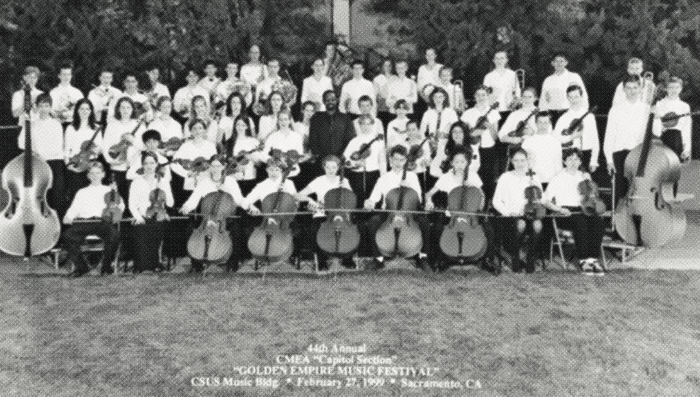
It’s also about being around great people and just being happy, and the recognition of not letting your ego define you. Yeah, I was in a band with a whole bunch of talented kids, I wasn’t the most talented, and it was okay. We had a bigger job to do than me worrying about getting my feelings hurt.
Looking back at those days, during competitions, when we approached the field at attention, all 168 of us performed our show and came off the playing field, still at attention. The crazy thing was that even though we hadn’t talked to each other for the last 45 minutes, when we got back to the bus, and they finally said, “at ease,” we collectively knew whether the show was good or bad. I don’t know how we knew it, but we were like, “oh, that was so-so,” or, “at ease,” and we erupted in celebration. Huh? I didn’t talk to you guys for 45 minutes, but we all somehow knew, and the competition scores reflected our emotions.
For me, it was about the responsibility, the teamwork, being cold, hungry, all that stuff. I was so into it that I forgot about how hard it was. It was hard, and I wouldn’t change a damn thing for a million bucks.
Building Community
My most ideal sense of community is not unlike Mr. A and the marching band, where there’s the recognition that not everyone can be the drum major. It was about discovering your talent and owning it. If you’re the cymbal player, you need to be proud of it because you’re going to be the best goddamn cymbal player in the world, this shit doesn’t work without you, too.
You’re just as important as the drum major. Just as important as the third flute player, and if you’re not or you don’t act like it, there’s the door. We’re about this because it only takes one kid to be off, right? Only takes one kid on the B flat, and we’re all playing C, it doesn’t sound right. Don’t be the kid on the b flat. Okay?
Do we treat people like that? Do we recognize them for their true selves? Oh, you’re black, you’re homeless, you’re disabled. See him for what he is instead of trying to make him what you think he should be. But we don’t roll like that, we’re always putting square pegs in round holes.

I want an educational system that helps kids figure out what they’re good at doing. You’re good with motors; you should be a mechanic. Encourage that kid to read and learn to become the best mechanic he can be. If it’s apparent that he’s good with his hands, maybe we can get him to really trust that, and then books might become more interesting for him. Give him a chance. See him for who he is and what he really can bring to the community.
So, when I say community, it means that everybody’s valuable, and we are helping people find their value and providing them with the opportunity to succeed. It’s about helping people figure out their lane and then helping them fill it up as big as possible. My dad said something to me that’s really interesting about why band uniforms are so important. He said, “you know, even though my drum major was 5’2″, when he put on that shako, he became 6 feet tall.” And Mr. A was always saying, “fill up the uniform, stand up straight, shoulders strong.”
When you get kids of different sizes doing that, there’s a uniformity, but you can only have that if everybody’s filling out their uniform, so you’ve got to help them fill it out so they can play their role. That’s what’s at the crux of all this. Let people be who they are and find their lane, and then encourage that and let them know that it’s going to be bumpy because finding who you are is never easy.
Education
Allowing people to make mistakes is one thing that’s great about teaching jazz to kids. I already know it’s going to be chaotic. It’s going to be a fucking mess. It’s about developing an understanding of whether that kid is really wrong, or is he looking for something?
Let’s step back and let him figure it out.
If you’re on him all the time, you’re stifling him. Let the kid make some mistakes and let him find it on his own. People are just so fascinating and capable of different things. I tell my students to imagine a sphere, now think about the middle of the sphere as being ultimate mastery. Where’s your point of entry? We’re all trying to get to the center. Well, some kids like rhythm, some kids like melody. Some kids love harmony. When you find whether the kid is rhythm or melody, then hit that. Once you get his confidence and once he hits in real taste, all of a sudden, you realize they just want to get to the center, so you must meet them at their point of entry. When he gets it, you have to get the fuck out the way. That’s what you do. I don’t remember my dad making me practice. I don’t remember Mr. A ever asking, “how’s the practice going?” He already knew.
There’s a lot of room for error when you encourage individuality. Yeah, problem solving and teamwork, that’s really the crux of music education, not star-making. Try to get people to be responsible for each other and listen to each other on the most basic level. It’s not deep. You have a voice; it’s time to use it, so use it in the context of this more significant thing.
My sense of community revolves around humanity. My utopian idea is to have arts be in the base curriculum, along with English, and the hard subjects. It shouldn’t be extracurricular because we’re all affected by art and music; it’s all around us, and so we should be informed about it.

This goes against the grain of our system, which is built to create mindless consumers. The dumber they are, the more they can sell them stupid shit. For example, people think Kanye West is a genius—Kanye is a very successful artist, but put on Mozart, listen to Bach, and you’ll hear genius. Kanye is a famous rapper, and he’s got very cool beats, but he’s not a genius. Again, education will help you to understand the difference between genius and fame.
We also have to recognize Duke Ellington in this conversation. He was the first African American entertainer that was never dehumanized—he never had to play a butler in a movie, like Louis Armstrong or Billie Holiday playing a maid—and that was because of his manager, Irving Mills. Irving’s like, “dude, we’re selling you as the new Mozart, we’re selling you as the top of the top. You can’t be seen doing any negro character cartoony shit.”
They spent a lot of money in trade papers and sued a lot of people to make sure that Duke’s image was always 100%. Now to be a black kid in the ’30s and every time you see this guy, he looks like a million bucks. Did that change any minds? Did that help any kids develop a sense of self? He’s the only black man in media in the 1930s that doesn’t look like a fucking clown.
So those images and use of iconicity are big. When kids today see Lil Wayne, he’s drugged out or whatever, those images lead to low self-esteem and over self-involvement, isn’t that what he’s projecting?
Duke was careful; he knew what he was projecting; he was representing the Harlem Renaissance. I think he even knew there were going to be eons of musicians talking about how great he was because he looked like a million bucks in every photo.
Today we’re dealing with depression, and degradation of our kid’s self-worth, because of their preoccupation with the gram (Instagram), watching all these other kids living a life that they’re not living. We need to help them understand that they’re cooler than that, and that’s all made up anyway, it’s all make-believe.
You got your homies; you should play music together, play in a rock band, and really make something. Know that you have the power to quit giving everybody else the power, and that starts with art.
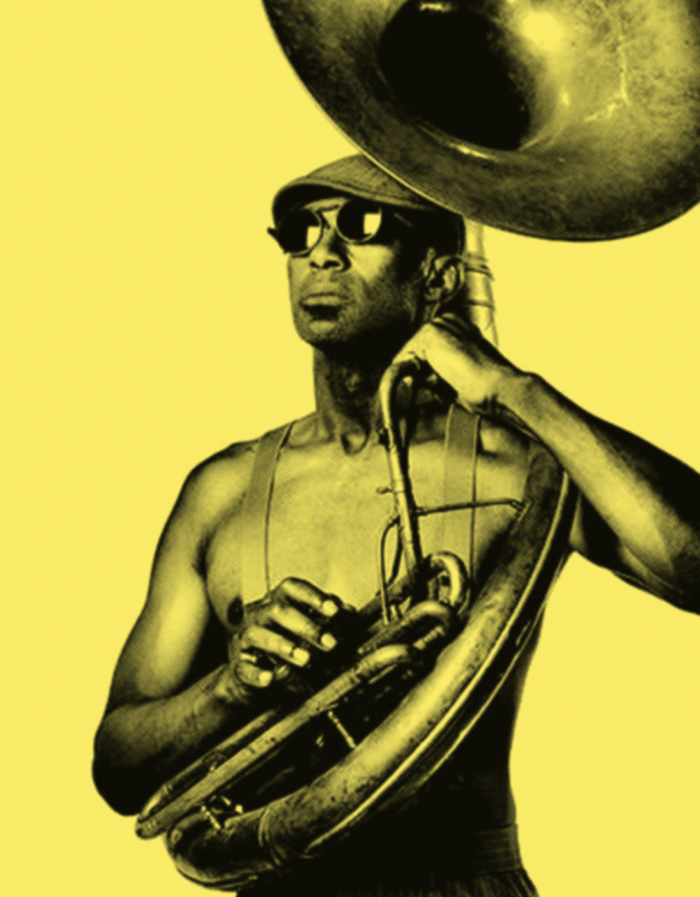
Advocacy
This was also part of the reason I co-founded Joe’s Style Shop, and it’s one of the things that I’m still proud of. It became a launching pad for so many artists that are doing good things now, like Shaun Burner. His first show was at Joe’s Style Shop.
I was heavily involved in the project from 1995 to 2000, and, after I left, they rolled for a couple more years as it grew into a broader community. Those folks are still my friends. As a matter of fact, Art Street was the continuation of Joe’s Style Shop. As Sean grew up and became an ass-kicker, he brought that whole family vibe to this community. He’s always reaching out, connecting communities, he’ll come to me with, “I need you to do the jazz thing” for things like Art Street.
I have a vast umbrella of friends and like-minded people in different disciplines who can support each other through collaboration. Like the gathering of the tribes, where various creative communities overlap and find ways to collaborate and support each other. That’s the world I want to live in.
The best thing about Art Street was that I got to wear all my hats. For something like music, I’m the lead; but, if they just needed someone to move things, or pick up trash, I did that as well. It was about everyone lifting hands and working together to make something memorable. That was one of the best shows on every level. The music was terrific, Art Hotel was cool, but Art Street was one of the best music events I’ve been to in a long time. My favorite part was the West End club, where we did a lot of jazz in the context of what a jazz club was like in the 30s, and people loved it.
They also put my orchestra on the big stage, with all the electronica kids, hip-hop kids, noise bands, and DJs. No segregation at all, just like art should be. The fact that city officials came and saw that, and that we still don’t have a music festival without some building going down, is criminal. It proved to me that we have a bunch of squares in power, and they need to get the fuck out of the way.
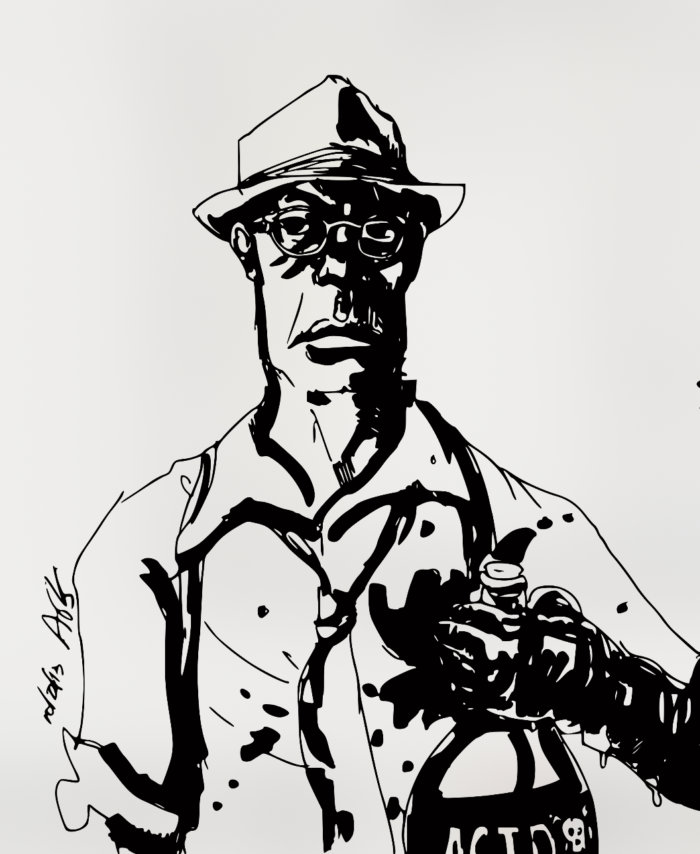
The City
The things I like about Sacramento don’t have anything to do with the government. The weather is beautiful, the farmer’s market—yeah, I guess I like the fact that they’ve gotten behind the food culture—although the Farm to Fork thing went too far when they took down the city’s slogan, “City of Trees.” I do like the fact that the restaurants are getting cheers and the farmers are getting a little shine. I do like that.
So, while I do like that we’re promoting our food culture, I don’t like the fact that it’s $18 for a hamburger. But I do love the creativity that’s happening in the food scene. There is a very artful food movement, and while a lot of it is hype, I have friends doing some good work, and I’m a little envious, you know, because the city really took it upon itself to shine a light on the Sacramento food scene.
Now, what we need is a horn to mouth festival, because unfortunately, in contrast, our musicians are more popular and well known than Sacramento’s chefs. You can go to Arizona and mention Randy Paragary, and the motherfuckers say, “who?” but the Def Tones they know. How does that work?
I remember when my artist friends could afford to live in Midtown. It was a golden era that’s gone. None of my artist friends live in Midtown anymore. I’m talking about successful artists; these are not broke people, they just can’t afford it anymore. We’re all getting displaced. Moving to houses in the suburbs, where people are renting and subletting rooms, we’re scattering everywhere, Natomas, Tahoe Park, Citrus Heights…
We have the city promoting that it’s all happening downtown! We’re all like, what the fuck’s happening downtown? The people that were downtown for the last 20 years have left. What’s there now?
But you know what? I was at Luna’s recently, there were 30 people there, straight jazz junkies, it was so good. They did a tribute to Monk; usually, they do free jazz, but they stayed inside. They did Monk and just killed it, on a Monday night! He gets no support from the city, and that place is an institution.
But, oh, the Sacramento Kings got a new house, and they’re still not playing above .500, after 20 years. But no cash in the kitty for Luna. I know how the city works; I’ve been in meetings where they declare, “oh, we have this equity initiative.” No, you don’t, everybody didn’t get a chance to hear about this. I can’t even get mad about it more.
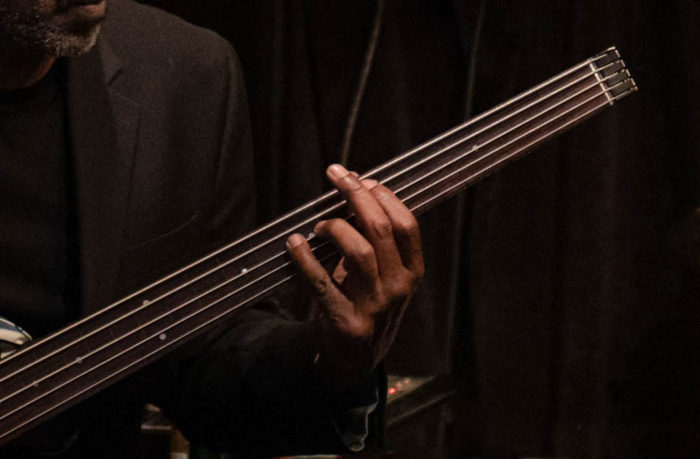
In the end, creatives make their own choices, that’s what every artist has gone through from Michelangelo to Dali to Duke. The question you have to answer is, “do you love this game?”
You have to decide if you really want to do this because whoever told you it was going to be sunshine and roses, and art openings were lying. You probably shouldn’t listen to them. Yes. Cut the lies and do it for yourself; you have to stay true to yourself and believe in what you’re doing. If you’re bending your vision to get your art to fit in some lame program, you’re doing a disservice to yourself for that $2,500 check. You end up creating some mediocre shit.
The problem is that a lot of people in the arts don’t have the commitment to do the repetition. Again, lip service. They know the shortcuts, but when it’s gritty time, meaning when it’s not fun, and no one’s looking, the folks that don’t have the discipline, or not focused on doing the work won’t succeed.
Moving Forward
If I had the $300,000 the city invested in Creative Edge grants, I’d bring the Sacramento Dixieland Jubilee back, but I’d be culturally sensitive and make it economically viable. First of all, it’d be a jazz festival in the real sense of the word. I would take Mayor Steinberg’s tourism committee to Europe and get them outside of this small, mid-western mindset because while jazz festivals in Europe have folks like Lenny Kravitz as the headliner, they also have a stage where the kids can go. They have the Herbie Hancock stage, where us old heads go, those festivals program that shit and put asses in the seats. All in the name of jazz.
Who’s segregated? The Rolling Stones headlining the New Orleans jazz festival! No, they’re not jazz, but they’re still there. You go catch the Stones, and I’ll hit the Ron Carter stage. So, who are these squares? Who are the people that don’t sit with the people of this culture but want to dictate to us what it should be? I say, ride along. It’s like, “what’s wrong with white kids today?” well, they don’t have any cool black kids to copy.

With Clark Goodloe
It’s all related, bro. It’s all connected. So, get the black kid into music cause you’re going to steal their style anyway. I got receipts on that, from Louis Armstrong to Little Richard and James Brown. They start something new, and white kids come and get paid more to do it.
We’ve got to stop that, when you throw a festival, don’t be segregated, let me repeat it, Beethoven, next to Berry in the B section, As Bill Graham said, let the people decide for themselves. They’re not stupid.
Frank Zappa breaks it down perfectly, talking about Woodstock, he proposes that rock music was better during the sixties when there was a bunch of old white dudes chomping on cigars and asking, “well, whaddya think, will it sell?”
After Woodstock, those same guys were like, oh shit; I need to go hire professional hipsters to find more of this shit. Woodstock was like 500,000 kids, so now we got the A and R guy, the middleman, the “professionals” making culture, replacing organic creativity. We don’t need that person. Let the people decide for themselves. It was better when a bunch of old dudes reacted to the culture instead of trying to create it. They were like, “oh, it sold, make some more.”
Just do something hip. Just have a cool music festival. Music that people want to see without segregating genres. Get the most significant artist you can get to perform at Raley’s Field and create smaller stages down the Capitol Mall, making it a real festival, celebrating all cultures in Sacramento.
Don’t even change the name, just bring back the Dixieland Jubilee. But this time add the black people, especially kids, cause they’re going to show you the future. Think about it, if schools did have a music program that feeds into the jazz festival as a city-wide annual school competition, with some of the proceeds earmarked to pay for high school jazz band programs. Then in 10, 15, 30, or more years, the kids who played in this festival become patrons. “I played this festival, I’ve been here for 43 years, I started when I was seven, and now my grandson plays trumpet”, that’s the circle of life thing, right?
There is no uniquely American music; it’s an amalgamation of all the people that were here and all the things that people brought to it. That’s why we have this enjoyable experience. That’s why when you have a jazz festival you don’t leave anyone out, everybody fits.
When you really respect the music, you don’t find yourself leaving people out. There is a ton of shitty pop music that I like. I don’t have to apologize for it. You don’t have to apologize for the shitty music you love. If you have a Kanye song that you like, that’s none of my business. We live in a place where you can listen to Beethoven, and you can listen to Kanye. Yeah, why not? I mean, I’m not going to do it, but if you do, more power to you.
With far less funding, I’d create a “battle of the bands” series. Whatever happened to the battle of the bands? They stopped having them! Here’s how it would work: have the metal kids going against the hip-hop kids, going against the old dudes with the bluegrass band. Who wins? The judge comes out, puts his hand over each group, and whoever gets the most screams wins. It’s not deep.
There are no panels, no experts. I’m trying to take the experts out. You don’t need them, let people judge for themselves what they like. But here’s something you have to understand going in, the boy band is going to win. We already know that, all right? Because this is about girls, and the girls are going to scream loudest for the boy band.
But here’s the positive, the guy who’s into reggae, even though his favorite band got fourth place, his favorite band is represented. If there was no battle of the bands, or it’s segregated to only metal bands, there’s nothing there for him. By being more inclusive, instead of 20 or 30 people at the show, you build attendance by representing all communities within the city.
The band that took second place, well, they like the drummer from another group. They go and get the drummer from band five and become the Beatles. If you don’t have these things happening, and people aren’t taking chances, you can’t really make these valuable connections.
Here’s the thing, we all know society is segregated, the bluegrass band is going to get the gig at the brewery, and that’s okay; that’s their community. Just let it happen. Don’t be the expert. No, we don’t need some A and R man, trying to find the next cool thing and label it. That’s where Sac News and Review went wrong with the SAMMIES. Fourteen categories: there’s alt-rock, hard rock, punk rock, rock emo. Now they have r & b cover bands. They’re doing too much and trying too hard.
The middleman is trying to make it seem like he’s doing something industrious. He’s not, can we get rid of these people? In this age of social media, do we need a cultural gatekeeper anymore? We don’t need Dick Clark or Don Cornelius to tell us which records are hits, just put the talent on and let people decide. It’ll go viral if it’s good or for whatever reason.



